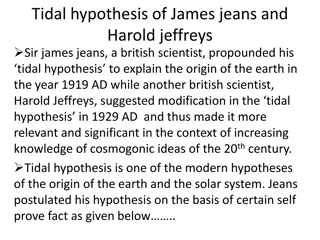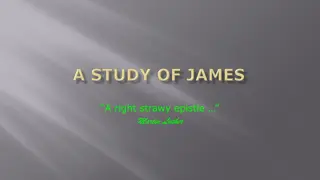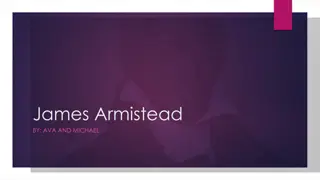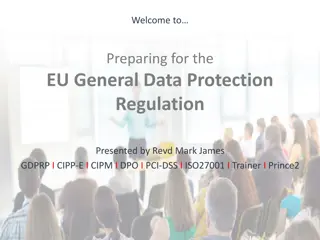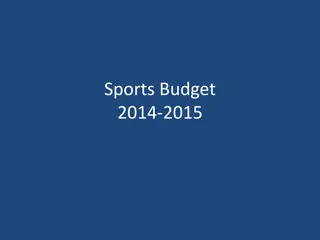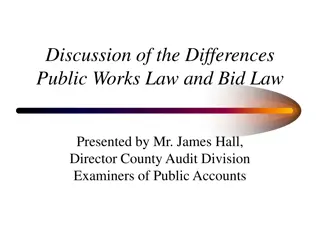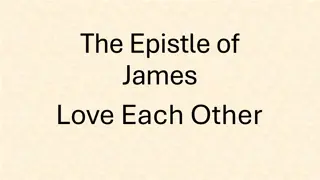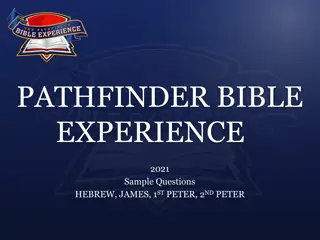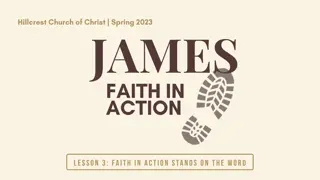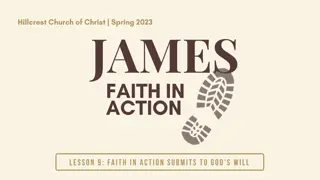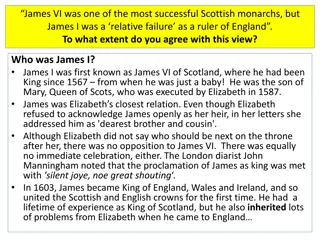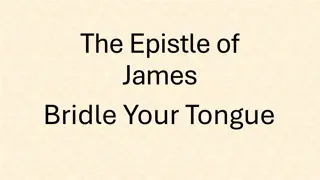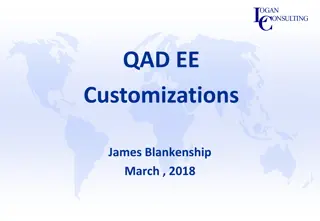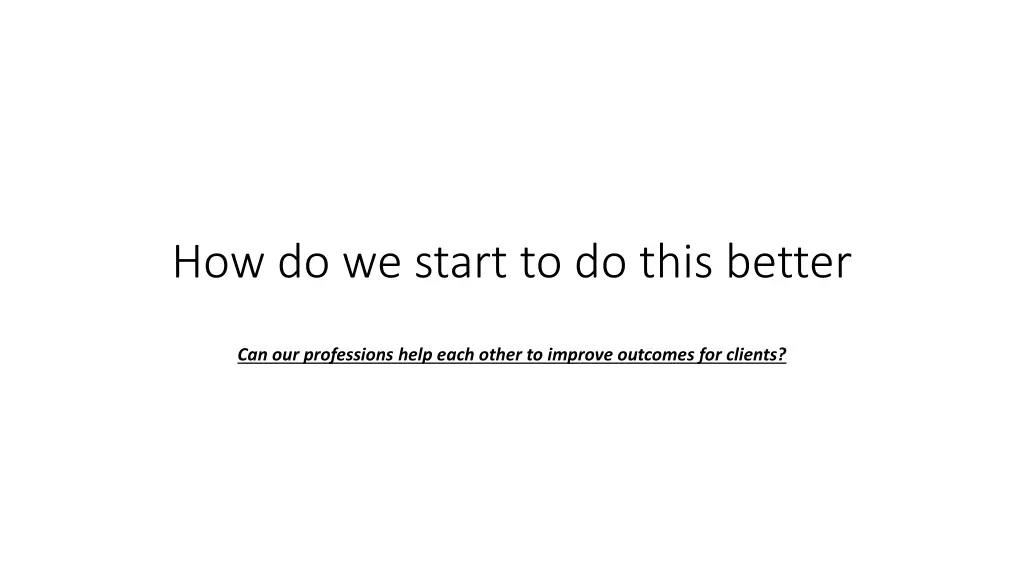
Enhancing Client Outcomes Through Interprofessional Collaboration
Discover how different professions can collaborate to improve client outcomes, with a focus on various approaches like Collaborative Court, FDR Mediation, and Arbitration. Explore the importance of expert evidence, impartiality, and conflict resolution in the legal process.
Download Presentation

Please find below an Image/Link to download the presentation.
The content on the website is provided AS IS for your information and personal use only. It may not be sold, licensed, or shared on other websites without obtaining consent from the author. If you encounter any issues during the download, it is possible that the publisher has removed the file from their server.
You are allowed to download the files provided on this website for personal or commercial use, subject to the condition that they are used lawfully. All files are the property of their respective owners.
The content on the website is provided AS IS for your information and personal use only. It may not be sold, licensed, or shared on other websites without obtaining consent from the author.
E N D
Presentation Transcript
How do we start to do this better Can our professions help each other to improve outcomes for clients?
ENE Collaborative COURT (thedefault) Together/ settle/ one lawyer / divorce surgery pFDR Mediation etc p p The path of process choices Arbitration
Different approaches a schism to keep in mind as we progress. Court based Hurdles often about reducing costs / managing delay and containing court days DR based Significantly more relaxed In mediation we will do what the parties need from us The design of the process up for grabs the SJE will be integrated into the process Reports may be given verbally etc Arbitration Arbitrator will usually do what the parties agree Will use FPR as backdrop But hurdles much easier to manage
Guidance & materials 1. (page 1) Part 25 and the related PDs (Page 26) summary chronology (p31) Enquiry letter (p47) D11 application (p56) Directions order (p61) Instructions letter (p66) McFarlane on experts (p69) GA v EL (p86) Nick Allen article (p90)Resolution guidance 10. (p114) Discussion points 1. Part 25 and the related PDs 2. 3. 4. 5. 6. 2. Directions order 3. Time to time Memorandums 4. The instructions 5. Caselaw / CPR [ Muyepa v MOD [2022] EWHC 2 648 (KB) ] 7. 8. 9. 6. Articles 7. Direction from the court
What is and what is not an expert s question? That is the question (quoted McFarlane memo)
(iii) Impartiality and Zuber Bux Impartiality requires there to be no conflict of interest: expert evidence should be and should be seen to be the independent product of the expert uninfluenced as to form or content by the exigencies of litigation. Kennedy v Cordia (Services) LLP (Scotland) [2016] UKSC 6 @52(1) now over to Mostyn J in Zuber Bux: Conflicts can be 1) financial 2) a conflicting duty 3) a personal connection It includes where you have been professionally or personally involved with one of the people involved in the case in the past or you have a personal interest in the case GMC Guidance on acting as a witness in legal proceedings (at para 31). Conflict types are 1) actual 2) capable 3) potential Where the solicitor had taken the expert to Wimbledon for the day with full hospitality. That largesse would not mean that a state of actual conflict of interest existed between the solicitor and the expert. However, there would be a potential conflict of interest which would need to be disclosed. (at para 28) Where an expert has an interest of one kind or another in the outcome of the case, this fact should be made known to the Court as soon as possible. The question of whether the proposed expert should be permitted to give evidence should then be determined in the course of case management. (at para 33) it is for the court and not the parties to decide whether a conflict of interest is material or not. (para 35) And later (at para 37), quoting Irwin LJ, Our adversarial system depends heavily on the independence of expert witnesses, on the primacy of their duty to the Court over any other loyalty or obligation, and on the rigour with which experts make known any associations or loyalties which might give rise to a conflict. Zuber Bux v GMC [2021] EWHC 762
days Scheduled delivery of form E (49 days to go before 1st appointment Actual delivery of form E, at best a week late Getting to grips with form E - ideally but actually other work got in the way Realise you need expert evidence and give notice to the other party - they get 10 days to consider this Say they come back objecting and suggesting Find yourself at impasse. 49 12/10/2023 The selection process [aka solicitors in a right tizzy!] 42 19/10/2023 7 26/10/2023 Many disorganised lawyers are trying to manage a lot - so let s just hold that in mind. 10 05/11/2023 What is clear (in my view) is: 4 09/11/2023 Lawyers need to identify the need pre form E delivery 4 13/11/2023 They need to precedentise up Then start thinking about making enquiries Wait for responses granted 4 days is ridiculous If you did then get answers and at that point, make application to court Wait for issued application Serve no fewer than 7 days before the hearing 1st appointment is due Anything you can do to make their lives easier is gold-dust 4 17/11/2023 They probably need to issue anyway [prior to identifying their expert] 21/11/2023[already 4 doomed!] The probably need their established SJEs 14 05/12/2023 They need to be efficient in knowing what those guys want. 10 15/12/2023 30/11/2023
NIFA nitiative? Could NIFA not move itself forward by generating the standard enquiry 1. First we would get away from all that nonsense of names [we could quote why this was reasonable and must be done] 2. Secondly you could lay down the information that you have to have 3. Thirdly you could get the parties to focus on the question that is being raised [you could even put on the website standard questions?] 4. You could take control of the process a bit eg a. Refining the question b. When to be notified c. Budget What of standard NIFA tobs from you with [key box on front re - Who is liable for fees - What is the rate - What is the likely sum - When is it due - You could also add in When does interest start - This is what we expect from you in terms of the timeframe - You could build in a discussion point
GDPR conflict checks and caution This is the question about whether you should demand full information about personal and corporate identities. In my view yes Data Protection Act 2018 schedule 9 permits the processing of data that is necessary a) for the administration of justice; or b) for the 3rd party [how can you proceed without conflict checks]. Sched 10 permits processing in connection with legal proceedings, to get advice or to exercise or defend legal rights.
Necessity FPR r25.4( 3) The court may give permission as mentioned in paragraph (2) only if the court is of the opinion that the expert evidence is necessary to assist the court to resolve the proceedings. 25.5 (2) When deciding whether to give permission as mentioned in rule 25.4(1) in proceedings other than children proceedings, the court is to have regard in particular to (a) the issues to which the expert evidence would relate; (b) the questions which the court would require the expert to answer; the proceedings; (c) the impact which giving permission would be likely to have on the timetable, duration and conduct of (d) any failure to comply with rule 25.6 or any direction of the court about expert evidence; and e) the cost of the expert evidence. There may be occasions where covering these aspects in your responses to enquiries may be very helpful. [Accepting too that often you may not know] Sir James Munby P in Re: H L (A Child) [2013] EWCA Civ 655 defined "necessary" as: "Lying somewhere between 'indispensable' on the one hand and 'useful', 'reasonable' or 'desirable' on the other hand", having "the connotation of the imperative, what is demanded rather than what is merely optional or reasonable or desirable". Although those were children proceedings, I regard his dicta as equally applicable to financial remedy proceedings. [per Peel J GA v EL 2023 EWFC 187
Cost capping Loggie v Loggie [2022] EWFC 2 The moral of this unhappy tale is that the parties must ensure that the court is asked, prior to the instruction of a SJE, to place a cap on the expert's costs pursuant to FPR rule 25(12)(5). Prior to the court making an order for the instruction of an SJE, there will have been preliminary enquiries raised with the proposed expert and responses given thereto. By virtue of PD 25D para 3.4, incorporating PD 25B para 8.1(e), the expert will have stated his/her costs, including hourly or other charging rates, and the likely hours to be spent conducting interviews, writing the report and attending court. The court will thereby be fully equipped to be in a position fairly to consider these figures and to impose a cap on the expert's costs. Of course, should circumstances unexpectedly change causing far more work to be done by the expert, then it will be open for the expert to apply for the order imposing the cap to be varied under FPR r 4.1(6).
Impasse your right / duty to seek court direction [and up the budget!] See FPR 25.17 (1) Experts may file written requests for directions for the purpose of assisting them in carrying out their functions. (2) Experts must, unless the court directs otherwise, provide copies of the proposed requests for directions under paragraph (1) (a) to the party instructing them, at least 7 days before they file the requests; and (b) to all other parties, at least 4 days before they file them. (3) The court, when it gives directions, may also direct that a party be served with a copy of the directions.
The report Business owner s notional income Should we have input on that? What is income and what is double dipping Can I have help on valuation You are sort of telling me what it is likely it could sell for - But shouldn t we be asking a different question? What resources will this marriage-generated thing create during the period ahead? I have one at the moment where a failure to see what I need - in effect report says if the director s loan is repaid then its value is x But there is no money to repay that loan so how does this begin to be helpful And note latest comments in GA v EL on Historic valuations - chill: they are not the be all and the end all - caution: the further back you go the more inaccurate they will be - control: the court not the expert decides pre and post marital wealth
Daniels v Walker [appointing 2nd expert] update The post FPR 2010 law per Peel J in GA vEL 2023 i) The party seeking to adduce expert evidence of their own, notwithstanding the fact that a single joint expert has already reported, must advance reasons which are not fanciful for doing so. ii) It will then be for the court to decide, in the exercise of its discretion, whether to permit the party to adduce such further evidence. iii) When considering whether to permit the application, the following non-exhaustive list of factors adumbrated in Cosgrove & Anor v Pattison (supra) may fall for consideration: "... although it would be wrong to pretend that this is an exhaustive list, the factors to be taken into account when considering an application to permit a further expert to be called are these. First, the nature of the issue or issues; secondly, the number of issues between the parties; thirdly, the reason the new expert is wanted; fourthly, the amount at stake and, if it is not purely money, the nature of the issues at stake and their importance; fifthly, the effect of permitting one party to call further expert evidence on the conduct of the trial; sixthly, the delay, if any, in making the application; seventhly, any delay that the instructing and calling of the new expert will cause; eighthly, any special features of the case; and finally, and in a sense all embracing, the overall justice to the parties in the context of the litigation'. iv) For my own part, I would draw particular attention to the words "the overall justice to the parties in the context of the litigation" which seems to me to encapsulate neatly the court's task.
The role of the lawyer In respect of what issues was permission given? Does the report answer those questions? Does it stray beyond them? Are those opinions within the expertise of this expert? Have they shown the basis upon which their conclusions were reached? Is it objective or more conjectural? What lacunae are left are they appropriately covered? Are there other facts that have not been properly addressed and that might have led to other conclusions? Has the duty under PD25B para 9 (to indicate the range of opinions where appropriate) been discharged? Is the report signed and with the appropriate statements and does it otherwise comply with the rules (many of the core elements are in para 9.1 of PD25B)?
Questions on your report See FPR 25.10 and Deputy High Court Judge NicholasAllen s pithy article in the Financial Remedies Journal of 19 May 2022 questions are for clarification, are asked once only and should be proportionate; they should not require an expert to carry out new investigations or expand significantly on the expert s report; and they are not to form cross-examination by post without court permission.
Keep the discussions open All of these pinch points would be so much less likely to rub if we were having more 3-way discussions See possible agenda points document What s missing?




